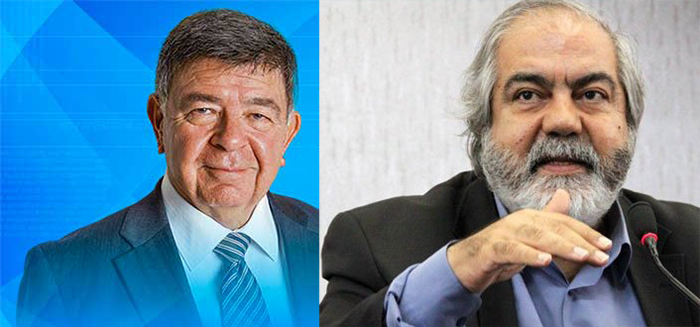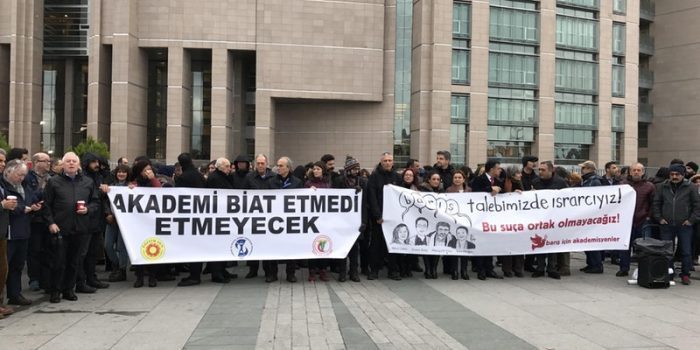23 Mar 2018 | Campaigns -- Featured, Statements, Turkey, Turkey Statements
[vc_row][vc_column][vc_column_text]

Şahin Alpay and Mehmet Altan
Turkey should immediately implement the judgments of the European Court of Human Rights (ECtHR) and release the veteran journalists Mehmet Altan and Şahin Alpay without delay, a coalition of nongovernmental groups said on 23 March 2018. Furthermore, Turkey must ensure that domestic remedies for human rights violations are effective, in particular by ensuring the urgent review of all cases of journalists and writers currently pending before its Constitutional Court.
The organizations, which had intervened as third parties in the cases before the court, included PEN International, ARTICLE 19, Committee to Protect Journalists, European Centre for Press and Media Freedom, European Federation of Journalists, Human Rights Watch, Index on Censorship, International Press Institute, International Senior Lawyers Project and Reporters Without Borders. The coalition welcomed the judgments announced on March 20, 2018. The rulings are the first by the court in the cases of journalists arrested and detained on charges in relation to the failed 2016 coup attempt in Turkey. They set an important precedent for the other cases of 154 detained journalists in Turkey.
“The Turkish government must take action to implement the European Court of Human Rights’ judgement. The ongoing trials are a serious breach of human rights and freedom of expression by the government. Turkey must cease its judicial harassment of journalists, academics and lawyers,” said Joy Hyvarinen, head of advocacy of Index on Censorship said.
In its two judgments, the European Court found violations of Article 10 of the European Convention on Human Rights, which protects the right to freedom of expression. The court made clear that criticism of governments should not attract criminal charges since, in addition to pre-trial detention, this would inevitably have a chilling effect on freedom of expression and would silence dissenting voices.
“We welcome these rulings, in particular the European Court’s recognition that a state of emergency must not be abused as a pretext for limiting freedom of expression,” said Carles Torner, executive director of PEN International.
While acknowledging the threat posed to Turkey by the attempted coup, the court crucially noted that “the existence of a ‘public emergency threatening the life of the nation’ must not serve as a pretext for limiting freedom of political debate, which is at the very core of the concept of a democratic society.”
The European Court has also found that the journalists’ detention was unlawful under the right to liberty protected by Article 5 (1) of the European Convention. The European Court endorsed the January 2018 ruling of Turkey’s Constitutional Court, which held that there was not sufficient evidence to keep the defendants in detention and ordered their release.
The judgment further sharply criticized the lower courts for refusing to carry out the Constitutional Court’s decision. In particular, the applicants’ continued pre-trial detention raised serious doubts as to the ability of the domestic legal system in providing an effective remedy for human rights violations, stating: “For another court to call into question the powers conferred on a constitutional court to give final and binding judgments on individual applications runs counter to the fundamental principles of the rule of law and legal certainty.”
“We welcome the court’s finding that the right to liberty of the applicants was violated,” said Caroline Stockford, Turkey Advocacy Coordinator for the International Press Institute. “The Court rightly criticised the refusal by the lower domestic courts to implement the Turkish Constitutional Court’s decisions and to release Mehmet Altan and Şahin Alpay.”
The European Court decided not to examine the applicants’ complaint that the detention of the applicants was politically motivated, under Article 18 of the convention.
“In deciding not to rule on Article 18, the European Court dodges an important question at the core of this litigation, which is whether Turkey’s prosecutions of journalists just for doing their work is part of a larger campaign to crack down on independent journalism?”, said Torner.
“The decision stated that ‘the investigating authorities had been unable to demonstrate any factual basis’that indicate that both journalists had committed the offenses with which he was charged’. The Court repeats what we have been saying with our affiliates for years to Turkish authorities that journalism is not a crime and journalists, like writers or academicians in the country, must not be prosecuted for their work or opinions,” said Ricardo Gutiérrez, EFJ General Secretary.
What the judgments mean for other cases
The judgments contain some important statements of principle on unlawful detention and freedom of expression. In particular, the European Court emphasised that it is not permissible to prosecute individuals on the basis of expression that is critical of the government.
However, in practice, the judgments also imply that the European Court will wait for the Constitutional Court to rule on the other pending cases of Turkish journalists before proceeding to its own review. This is because the European Court still considers the Constitutional Court an effective remedy in general.
Although the European Court was prepared to accept the length of time the Constitutional Court took to review these cases, the judgment is effectively putting the Constitutional Court on notice, saying that it will keep the situation under review and that it cannot continue taking this long to decide on cases.
The coalition repeats its call for the immediate implementation of these two judgments and for the release of Mehmet Altan from prison and Şahin Alpay from house arrest.
“These judgments are an important affirmation of the right to free expression and clearly state that the state of emergency is not a good enough reason to hold journalists and writers in detention for what they say,” said Gabrielle Guillemin, Senior Legal Officer at ARTICLE 19. “The Turkish authorities must now immediately release them both and the Turkish courts should apply these principles to the many other cases of detained journalists in Turkey,” she added.
[/vc_column_text][/vc_column][/vc_row][vc_row][vc_column][vc_basic_grid post_type=”post” max_items=”12″ style=”load-more” items_per_page=”4″ element_width=”6″ grid_id=”vc_gid:1521808770518-0e88bc5e-2722-5″ taxonomies=”8862″][/vc_column][/vc_row]
24 Jan 2018 | Events
[vc_row][vc_column][vc_column_text]
Both before and after the state of emergency that followed the botched coup in 2016, the Justice and Development Party (AKP) government has shown increasing authoritarian tendencies, rolling back an essentially weak democracy. Now a truly authoritarian regime is in place and instigates multiple attacks against fundamental rights and democratic institutions, such as arbitrary arrests and prosecutions of critical voices, extensive use of emergency decrees, massive purges of the state institutions and the witch hunt against the Academics for Peace, signatories of the Peace petition. As it is generally the case, free speech and academic freedom have been major casualties of this authoritarian drift. Gathering academics, lawyers and human rights defenders, this panel will offer a critical insight into current legal and political developments in Turkey and discuss the way forward in the defence of freedom of expression and academic freedom in the country.
Panel 1 – 14.30 – 16.00 Free Speech under Threat in Turkey: A Legal Approach
Chair: Noémi Lévy-Aksu (Birkbeck College)
Ayse Bingöl (Media Legal Defence): The criminalisation of speech under state of emergency regime.
Bill Bowring (Birkbeck College, Professor of Law): Recent Strasbourg case law on freedom of expression in Turkey.
Oya Aydın (Lawyer): What are the Academics for Peace accused of?
Panel 2 – 16.15 – 17.30 Trial Observation, Legal Intervention and Advocacy
Chair: Mehmet Uğur (University of Greenwich)
Georgia Nash (Article 19)
Sarah Clarke (Pen International)
Hanna Machlin (Index on Censorship)[/vc_column_text][vc_row_inner][vc_column_inner][vc_column_text]
When: Tuesday 30 January 2018, 2:30-5:30pm
Where: Birkbeck College, London (Map)
Tickets: Free. Register here
[/vc_column_text][/vc_column_inner][/vc_row_inner][/vc_column][/vc_row]
19 Jan 2018 | Americas, Campaigns, Campaigns -- Featured, Media Freedom, media freedom featured, Statements, United States
[vc_row][vc_column][vc_column_text]
St. Louis, Missouri — An already adverse environment for journalists in the Midwestern United States has worsened in the year since President Trump’s inauguration, an international group of media watchdogs concluded after travelling to the state of Missouri. The group also met with journalists from Illinois and Wisconsin.
The fact-finding mission this week concluded in St. Louis, where journalists were indiscriminately arrested in 2014 and 2017 during protests in response to police shootings in the city and its suburb, Ferguson. The group also met with journalists from the city of Columbia and the capital, Jefferson City, as well as representatives of the Missouri Press Association and national media groups headquartered at the Missouri School of Journalism.
The group, which included leaders of Index on Censorship, the Committee to Protect Journalists, IFEX, Article 19, and the International Press Institute, found that local public officials have embraced Trump’s rhetoric toward the media and bypassed the press in favour of social media. A Wisconsin sheriff used expletives to deny an interview. Missouri Gov. Eric Greitens has called the media “fake news,” refused interviews, and directed his staff to use software that immediately erases mobile chats.
“The hostility to the press at the national level gives a free pass for state officials to use harmful rhetoric and has contributed to a polarisation in public attitudes toward the press,” said Marty Steffens, North American chair and member of the executive board of the International Press Institute, a global network of journalists and editors. Steffens, also a professor at the Missouri School of Journalism, served as local host for the mission.
Journalists stressed that the threats are not new, but an acceleration of existing trends of public mistrust and political obstruction of the press. They were split on how the national discourse has affected their daily reporting, with some saying they see it as simply one more factor in an already difficult environment.
A longstanding unwillingness of authorities in Missouri to comply with freedom of information laws has worsened since Trump’s election, with extended delays, prohibitive costs, and the use of technological tools to prevent the release of public records, journalists said. They cited a lack of effective independent oversight and inadequate training of public officials regarding what is known as the Sunshine Law.
“The reality of shrinking newsrooms and financial resources for news media makes the adherence of authorities to both the letter and spirit of the Sunshine Law ever more important. The disregard being shown poses the question whether the current legal structure is fit for purpose,” said Thomas Hughes, executive director of Article 19.
Hostility to the media comes as the Midwestern press corps has been hit hard by changing economic conditions. News staffs in Missouri as well as Chicago and Milwaukee, Wisc., told the group that declining revenues have reduced reporting ranks by two-thirds. One Wisconsin editor said some public meetings go uncovered, leaving the public uninformed about the use of tax dollars.
Proposed legislation in some Midwestern states would shift mandated paid public notices to government websites, making the information harder to find and exacerbating the media’s economic woes, especially at small community newspapers. This also raises the spectre that authorities could use public notice revenues as a means to influence editorial content.
“While many reporters are more galvanised than ever in the current news climate, local media and city newspapers said they did not receive the bump in funding and subscriptions that bolstered national papers after the election,” said Courtney Radsch, advocacy director at the Committee to Protect Journalists. “Journalists said lack of financial resources make it harder to fight back when politicians deny access.”
One photographer from the St. Louis Post-Dispatch told the delegation that at public demonstrations, journalists are increasingly caught between aggressive police and sometimes hostile protesters. In St. Louis and Ferguson, police have adopted increasingly militarised tactics such as “kettling”— a surround-and-arrest tactic that sweeps up working journalists and bystanders. In the fall of 2017, at least 10 journalists were arrested in St. Louis during protests over a police shooting. Two new protest laws up for consideration in the state could raise the stakes for journalists who are swept up in arrests.
“Nothing fake about the dedicated and resilient journalists working in Missouri encountered during this tour. They continue to play a key role in keeping the public informed and the democracy healthy in spite of myriad challenges,” said Annie Game, IFEX executive director.
CPJ is an independent, nonprofit organisation that works to safeguard press freedom worldwide.
Media contacts:
Bebe Santa-Wood
Communications Associate
[email protected]
212-300-9032[/vc_column_text][/vc_column][/vc_row][vc_row][vc_column][vc_basic_grid post_type=”post” max_items=”4″ element_width=”6″ grid_id=”vc_gid:1516359796596-1b5d0b84-b35f-5″ taxonomies=”579″][/vc_column][/vc_row]
18 Oct 2017 | Campaigns -- Featured, Malta, media freedom featured, Statements
[vc_row][vc_column][vc_column_text]

Daphne Caruana Galizia
Sixteen press freedom groups condemn the killing of investigative journalist Daphne Caruana Galizia and demand an immediate and independent investigation into her death.
“The murder of a prominent investigative journalist in broad daylight in an EU Member State underscores the seriousness of this crime. Daphne Caruana Galizia’s work as a journalist to hold power to account and shine a light on corruption is vital to maintaining our democratic institutions. Her killing is a loss for her country and for Europe”, Hannah Machlin, project manager for Index on Censorship’s data platform Mapping Media Freedom, said.
Daphne Caruana Galizia was killed when the car she was driving exploded in Bidnija around 15.00 on 16 October in what is thought to have been a targeted attack..
“The barbaric murder of Daphne Caruana Galizia is an attack on journalism itself. This crime is meant to intimidate every investigative journalist,” Dr Lutz Kinkel, Managing Director of the European Centre for Press and Media Freedom, said.
“Because Prime Minister Joseph Muscat and parts of Malta’s political elite were targets of Galizia’s disclosures, we strongly recommend an independent investigation of this case. The killers have to be found and put on trial.”
The blast left her vehicle in several pieces and threw debris into a nearby field. Half an hour before the powerful explosion, the journalist posted a comment about a libel claim the prime minister’s chief of staff had brought against a former opposition leader over comments the latter made about corruption.
Galizia filed a police report 16 days ago saying she was being threatened.
Galizia had conducted a series of high profile corruption investigations and has been subject to dozens of libel suits and harassment. Because of her research, in February, assets were frozen following a request filed by Economic Minister Chris Cardona and his EU presidency policy officer Joseph Gerada.
On 24 August opposition leader Adrian Delia filed a lawsuit against her over stories linking him to offshore accounts totalling to £1 million earned from alleged prostitution in London flats. On 11 March Silvio Debono, owner of the real estate investment company DB Group, filed 19 libel cases against her after Caruana Galizia published a number of articles about his deals with the Maltese government to take over a large tract of high value public land.
Galizia also conducted an investigation linking the Prime Minister Joseph Muscat and his wife Michelle to secret offshore bank accounts to allegedly hide payments from Azerbaijan’s ruling family, which were unveiled in the Panama Papers. She worked on this investigation with her son Matthew Caruana Galizia, a journalist for the Pulitzer prize winning International Consortium of Investigative Journalists, who has had his posts on allegations of wrongdoing by Prime Minister Joseph Muscat and his associates censored on Facebook.
On 17 October 2017, her family filed an urgent application for the Duty Magistrate Consuelo Scerri Herrera to abstain from investigating Caruana Galizia’s murder because of the court’s “flagrant conflict of interest”. In 2011, the magistrate initiated court proceedings against the journalist over comments she had made about Magistrate Herrera.
Seven reports of violations of press freedom were verified in Malta in 2017, according to Index on Censorship’s Mapping Media Freedom project. Five of those are linked to Caruana Galizia and her family.
The murder has brought widespread condemnation from the international community including statements from Council of Europe Secretary General Thorbjørn Jaglan and OSCE’s Media Freedom Representative Harlem Désir.
We, the undersigned press freedom organisations call for:
— An independent and transparent investigation into the killing of Daphne Caruana Galizia
— Protection for her family members and for other Maltese journalists who have been under threat
— Measures to protect the environment for independent and critical journalism to ensure that reporters can work freely
———————————————————————
Article 19
The Association of European Journalists (AEJ)
The Center for Investigative Reporting
Committee to Protect Journalists
The European Centre for Press and Media Freedom
The European Federation of Journalists (EFJ)
Freedom of the Press Foundation
Index on Censorship
International News Safety Institute (INSI)
International Federation of Journalists (IFJ)
International Press Institute (IPI)
Osservatorio Balcani e Caucaso Transeuropa (OBCT)
Ossigeno per I’nformazione
Platform of Independent Journalism (P24)
Reporters Sans Frontieres (RSF)
South East Europe Media Organisation (SEEMO) [/vc_column_text][/vc_column][/vc_row][vc_row][vc_column][vc_basic_grid post_type=”post” max_items=”12″ style=”load-more” items_per_page=”4″ element_width=”6″ grid_id=”vc_gid:1508321261018-6a10a188-6c0b-6″ taxonomies=”8996″][/vc_column][/vc_row]




